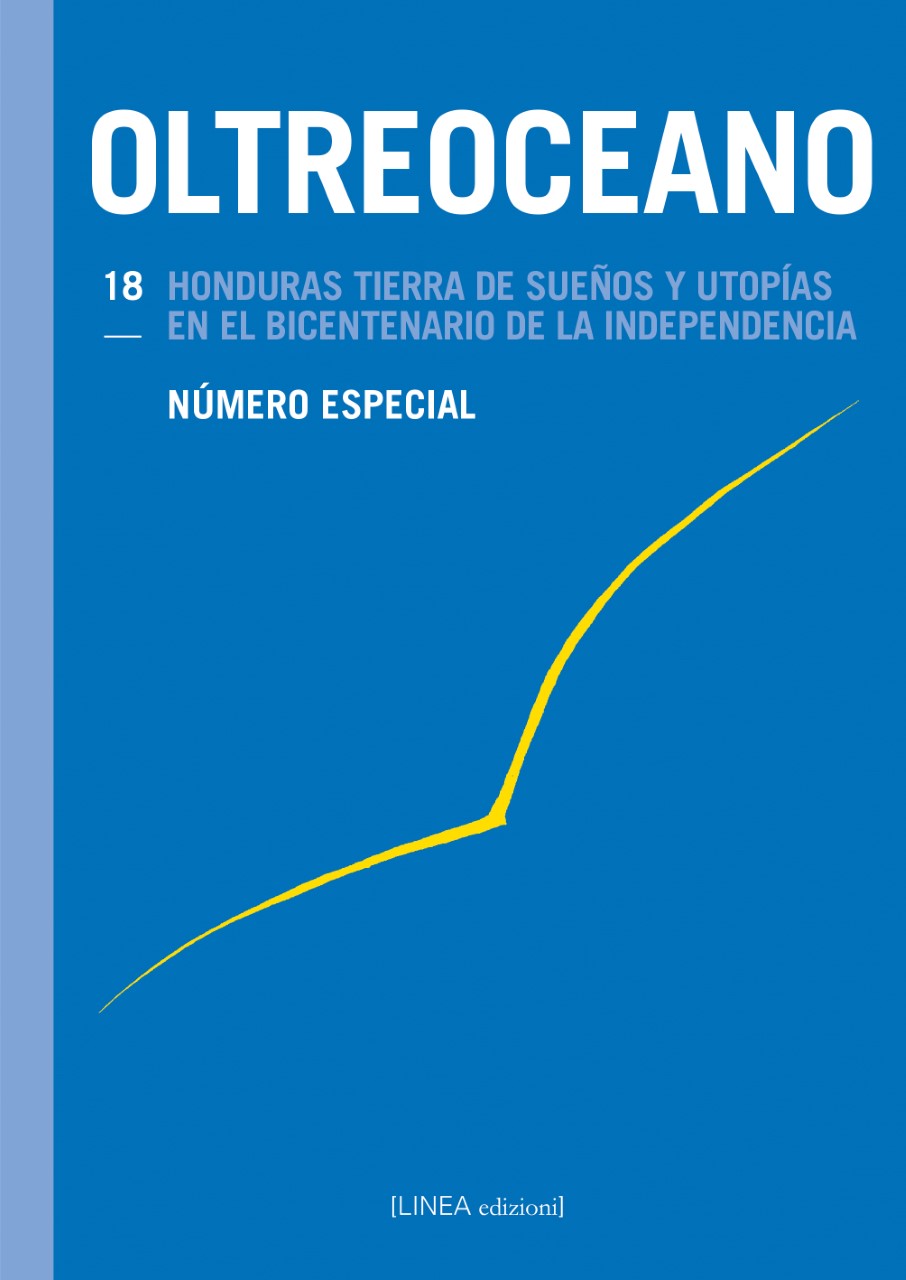Honduras literaria. La posibilidad de una (auto) presentación
DOI:
https://doi.org/10.53154/Oltreoceano22Keywords:
auto presentación, patria, cultura, Honduras literariaAbstract
El poder de recreación e interpretación de la realidad hondureña, por la vía de la legitimidad de la palabra escrita, vuelve realizable la posibilidad de auto presentación. Para ello la literatura, como retrato honesto, nos convoca a través de entramados narrativos y poéticos que emergen de la necesidad de habitar y expresar la esencia de la patria según sensibilidades distintas.
Literary Honduras. The Possibility of a (Self) Presentation
The power to re-create and interpret the Honduran reality thanks to the legitimacy of the written word makes the possibility of self-presentation feasible. By providing a truthful portrait, literature thus calls us to action through narrative and poetic frameworks that emerge from the need to inhabit and express the essence of the homeland according to different sensibilities.
Downloads
References
Acosta, Ó. (2018): Marco A. Soto, único gobernante hondureño socio de honor de la RAE. Recuperado de https://www.latribuna.hn/2018/04/28/marco-soto-unico-gobernante-hondureno-socio-honor-la-rae/.
Amaya, J. (2009): Historia de la lectura en Honduras: libros, lectores, bibliotecas, librerías, clase letrada y la nación imaginada en honduras. 1876-1930. Tegucigalpa: Universidad Pedagógica Nacional Francisco Morazán.
Cañeque, C. (1995): Conversaciones sobre Borges. Barcelona: Destino.
Gaitán, N. A. (2002): Índice bibliográfico del cuento en Honduras. Revista de la Academia Hondureña de la Lengua, 6, pp. 73-106.
Gallardo, M. (2005): Códigos y contextos del relato fantástico en Honduras. Revista de la Academia Hondureña de la Lengua, 13, pp. 53-67.
González, J. (2008): Cronología de la literatura hondureña del siglo XX. Tegucigalpa: Instituto de Antropología e Historia.
González, J. (2013): El Guacerique, primer periódico literario de honduras, 1892. Recuperado de https://josegonzalezparedes.blogspot.com/2013/.
González, J. (2016): Carías y los intelectuales de su época (1933- 1948). Tegucigalpa: Guardabarranco.
Henríquez, F.L. (2005): Figuraciones: tendencias de la poesía actual hondureña. Revista de la Academia Hondureña de la Lengua, 13, pp. 67-75.
Herranz, A. (1983): Antología. Introducción al estudio de la Literatura Hondureña. Tegucigalpa: Guaymuras.
Huxley, A. (2001): Literatura y ciencia. En F. Vidal, Sorkunde. Elogio de la literatura (pp. 171-184). Revista de Psicodidáctica, 12.
Infante, S. (2020): Rodeando la prosa de Molina. Recuperado de https://www.latribuna.hn/2020/11/08/rodeando-la-prosa-de-molina/.
Martínez, S. (1970): Francisco Morazán frente a la historia. Tegucigalpa: Calderón.
Medina Durón, J. A. (1995): Historia General de la literatura hondureña y glosario de términos literarios. Tegucigalpa: Lithopress.
Molina, J. R. (2000): Honduras literaria. En J. R Molina, Tierras, mares y cielos (p. 117). Tegucigalpa: Graficentro.
Pineda, A. L. (1998): Honduras, mujer y poesía: antología de poesía hondureña. Tegucigalpa: Guardabarranco.
Rosa, R. (1904): Mi maestra escolástica. Revista del Archivo y de la Biblioteca Nacional de Honduras, I, p. 350 y siguientes.
Suárez, C. (1998): Tardé mucho en saber lo que era patria. En Honduras, mujer y poesía: antología de poesía hondureña (p.177). Tegucigalpa: Guardabarranco.
Thais, E. (1998): Cómo te amo patria. En Honduras, mujer y poesía: antología de poesía hondureña (p. 272). Tegucigalpa: Guardabarranco.
Valle, Á. (1998): Los desheredados. En Honduras, mujer y poesía: antología de poesía hondureña (p. 238). Tegucigalpa: Guardabarranco.
Varela y Varela, O. (1998): Tierra de mis mayores. En Honduras, mujer y poesía: antología de poesía hondureña (p. 238). Tegucigalpa: Guardabarranco.
Downloads
Published
How to Cite
Issue
Section
License

This work is licensed under a Creative Commons Attribution-NonCommercial-ShareAlike 4.0 International License.
The authors undertake to comply with the following conditions, which are considered accepted at the time of submission of their contributions.
The sending of a text implies that it is unpublished and not submitted to be published elsewhere.
1. If accepted, the author shall confer on the publisher the right to publish and distribute it both in paper form and in the online electronic edition. The published articles will be downloadable and made available in open access.
2. Provided that it correctly indicates that the first publication took place in the journal Oltreoceano. Rivista sulle migrazioni the author has the right to: a) reproduce the article in separate extracts or collected in a volume; b) publish the article on their personal website or teaching site provided that these sites are of a non-commercial nature; c) deposit the article in online archives of a non-commercial nature, linked to the institution they belong to or as part of projects for the non-commercial dissemination and open access of scientific works.
The use of contributions by third parties, for commercial or otherwise unauthorized purposes, is not allowed. The publisher declines all responsibility for the unauthorized use of the material published in the journal.












